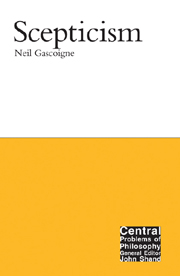3 - Demons, doubt and common life
Summary
Introduction
For most philosophers, the Meditations on First Philosophy (1641) marks the beginning of a new phase in the long history of scepticism. As we saw in Chapter 1, foundationalism is one attempt to respond to the Agrippan argument, which threatens the idea that any of our beliefs are justified. Descartes's ‘First Philosophy’ is the original systematic attempt to formulate such a response. Crucially, he uses scepticism in a methodologically constructive way to advance his foundational project and in doing so gives rise to another sort of sceptical problem, which we have associated with the argument from ignorance. The task for the first part of this chapter is to examine how the emergence of this new form of scepticism relates to the disengagement of epistemology from a practical concern with the good life and with the theoretical attitude. As we saw in Chapter 2, the idea of cognitive responsibility for the Ancients is linked to the achievement of a practical goal and thus with a certain idea of what sort of thing the responsible knower is. Part of this task will therefore be to investigate what cognitive responsibility amounts to when practical concerns are eliminated, and what new concept of the knowing subject emerges as a result.
The association of Descartes's philosophical method with a response to the Agrippan argument is not arbitrary. The works of Sextus and other Ancient Sceptics were rediscovered in the sixteenth century and had a profound influence on the direction of European thought and culture in the hundred or so years before the Meditations appeared.
- Type
- Chapter
- Information
- Scepticism , pp. 68 - 99Publisher: Acumen PublishingPrint publication year: 2002

